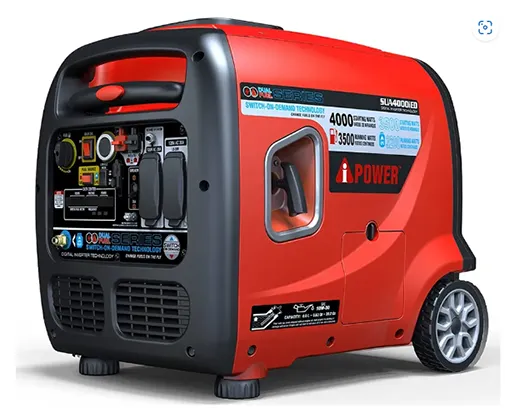Make: PowerSmart
Model: 2500W
Electric Start: No
Fuel: Gasoline
Technology: Inverter
Gas Starting Watts: 2500
Gas Running Watts: 1900
Weight (lbs): 40
Noise (dB): 56
The PowerSmart PS5020W inverter is a super quiet and highly portable generator able to provide you with power outdoors and in your home. It produces clean and reliable power with 2500 peak watts and 1900 running watts and its 1.05 gallon fuel tank allows it to run for up to 11 hours at 25% load.
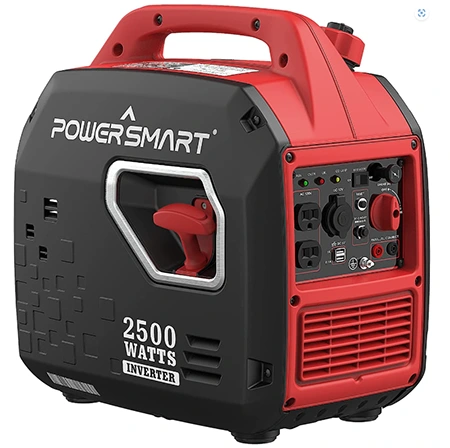
Make: Honda
Model: EU3200i
Electric Start: No
Fuel: Gasoline
Technology: Inverter
Gas Starting Watts: 3200
Gas Running Watts: 2600
Weight (lbs): 59.1
Noise (dB): 58
Honda are recognized for producing some of the most premium, robust, and reliable portable generators available. This, the EU3200i, is a top notch model, tough, lightweight, and powerful packing a host of useful features including a carbon monoxide sensor designed to keep you safe.
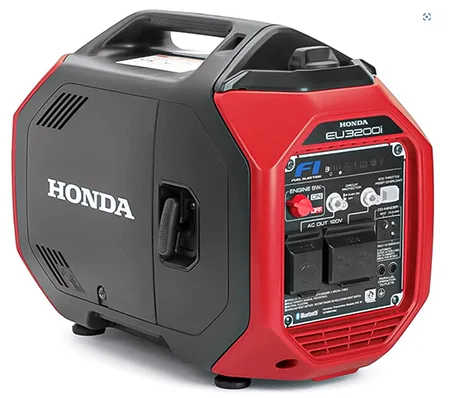
Make: PowerSmart
Model: 4400W
Electric Start: No
Fuel: Gasoline
Technology: Inverter
Gas Starting Watts: 4400
Gas Running Watts: 3500
Weight (lbs): 72.8
Noise (dB): 68
The PowerSmart 4400W is a popular and well-regarded choice both for home use and outdoor activities due to its relative quietness, portability, reasonable power and economical operation. It’s parallel capable so with an identical model attached you can double the power outputs.
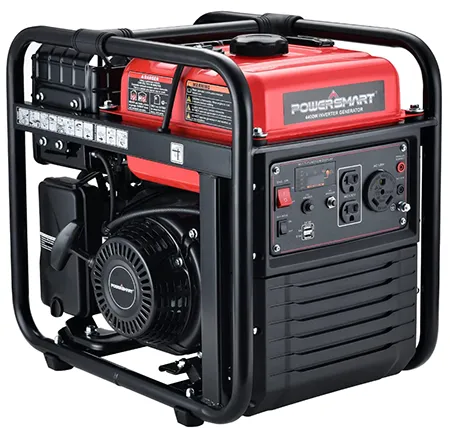
Make: Westinghouse
Model: iGen4500
Electric Start: Yes
Fuel: Gasoline
Technology: Inverter
Gas Starting Watts: 4500
Gas Running Watts: 3700
Weight (lbs): 98
Noise (dB): 52
Offering medium-power, this inverter has features that finely balance portability, quality, reliability and wattage. It’s suitable for recreational uses and is a good source of emergency power. And you can connect it to and run parts of your home when the power grid goes down.
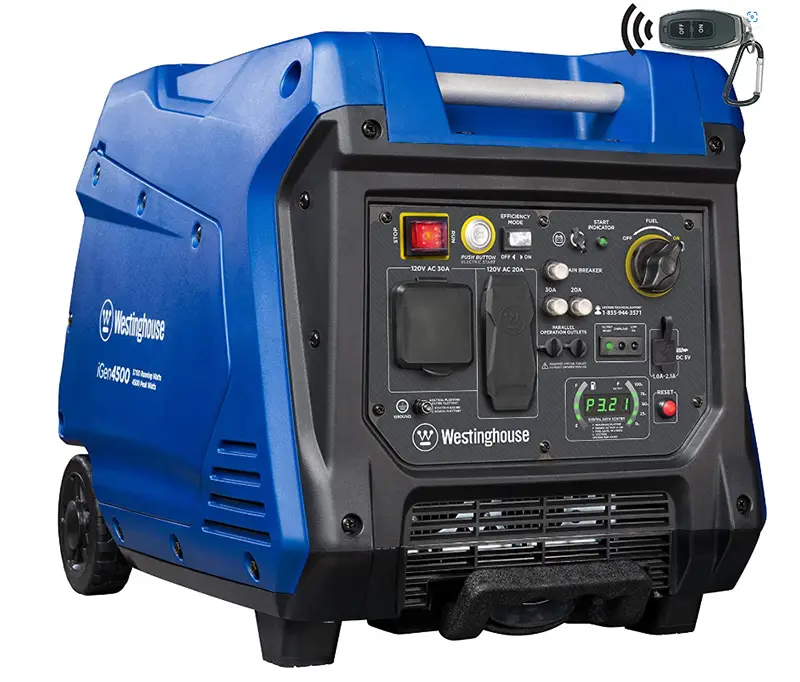
Make: Westinghouse
Model: iGen2200
Electric Start: No
Fuel: Gasoline
Technology: Inverter
Gas Starting Watts: 2200
Gas Running Watts: 1600
Weight (lbs): 48.5
Noise (dB): 50
This is a compact, quiet and lightweight inverter, ideal for camping, tailgating, boating and other recreational activities. It can be useful for short-term emergency backup of very basic home essentials and it can power most portable refrigerators and other equipment while away from home.
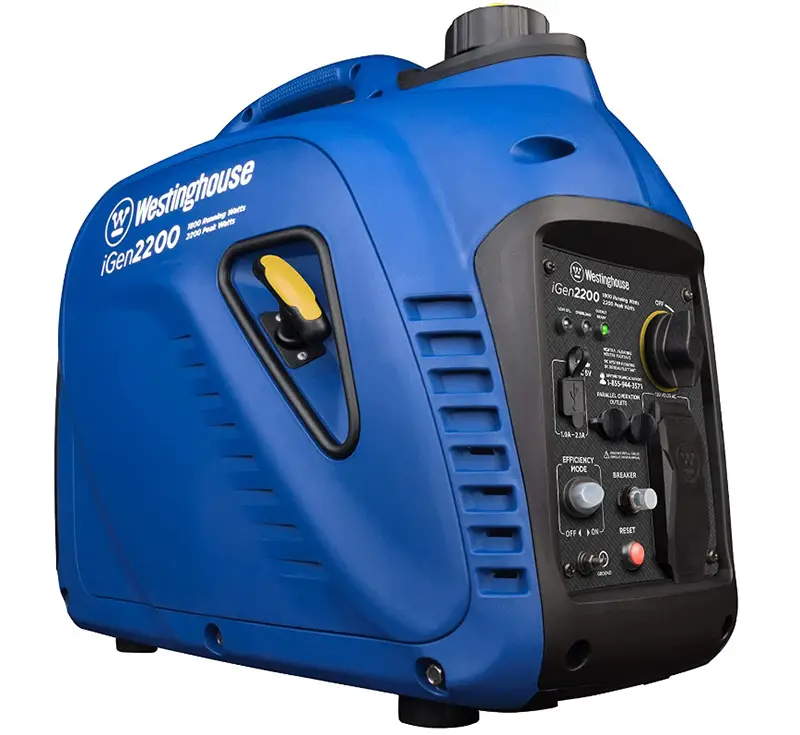
Make: WEN
Model: 56200i
Electric Start: No
Fuel: Gasoline
Technology: Inverter
Gas Starting Watts: 2000
Gas Running Watts: 1600
Weight (lbs): 39
Noise (dB): 50
The WEN SQ56200i is a light and super quiet portable inverter making it an attractive option for weekend camping and tailgating where it is able to power lights, a small microwave, music system or a laptop. It could also be a useful additional power source for boat and RV owners.
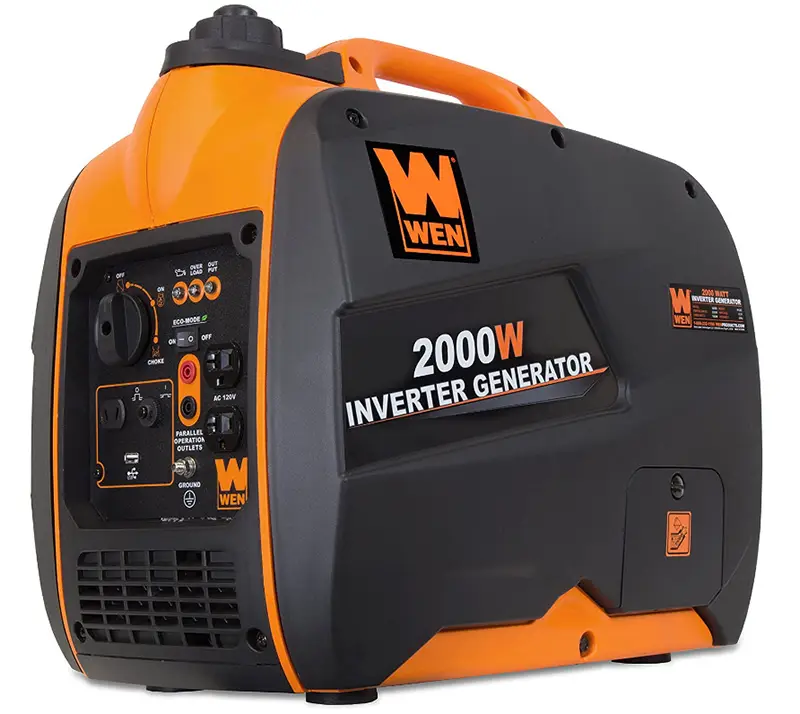
Make: WEN
Model: GN400i
Electric Start: No
Fuel: Gasoline
Technology: Inverter
Gas Starting Watts: 4750
Gas Running Watts: 3750
Weight (lbs): 66.1
Noise (dB): 67
The GN400i has an open frame with a compact, lightweight and innovative design. Inverter technology delivers clean power for use with sensitive electronics, and it’s ideal for a jobsite, campsite, and your RV. In the home it can run a fridge, lights and freezer when grid power goes down.
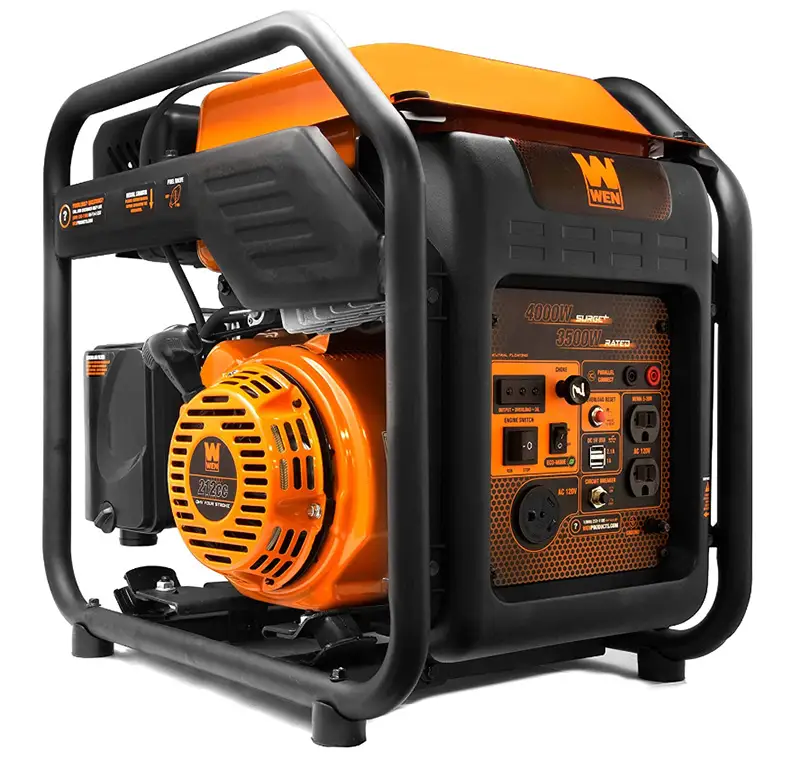
Make: WEN
Model: 56380i
Electric Start: Yes
Fuel: Gasoline
Technology: Inverter
Gas Starting Watts: 3800
Gas Running Watts: 3400
Weight (lbs): 99.2
Noise (dB): 57
This WEN portable inverter has a lot going for it. It’s reasonably powerful, affordable, compact, lightweight, and quiet. Buyers include recreational users, boat and RV owners, and those who need to power basic equipment for short periods when access to the the grid is not possible.
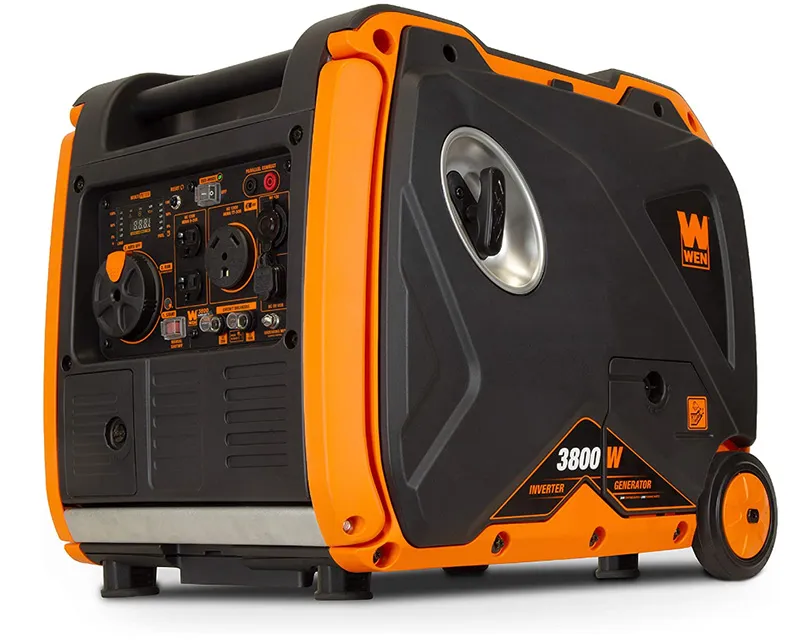
Make: WEN
Model: 56225i
Electric Start: No
Fuel: Gasoline
Technology: Inverter
Gas Starting Watts: 2250
Gas Running Watts: 1800
Weight (lbs): 48.5
Noise (dB): 53
This is another compact, lightweight, and super quiet inverter from WEN. It has a variety of light recreational applications for campers, boat and RV owners, and for very limited backup of really essential appliances for short periods during a blackout. Being an inverter, it’s safe to use with sensitive electronics.
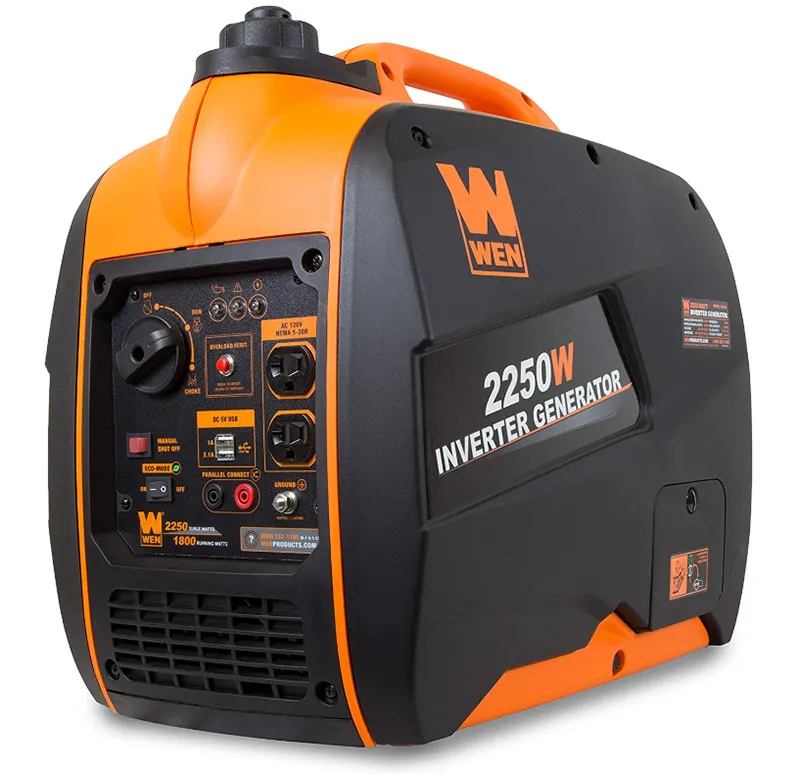
Make: WEN
Model: 56203i
Electric Start: No
Fuel: Gasoline
Technology: Inverter
Gas Starting Watts: 2000
Gas Running Watts: 1700
Weight (lbs): 39
Noise (dB): 51
The WEN 56203i portable inverter r is a very affordable, compact, lightweight, and quiet model. It’s aimed at recreational users, boat and RV owners, and for powering very basic appliances for a short time during power outages. Inverter technology means you can safely power sensitive electronics.
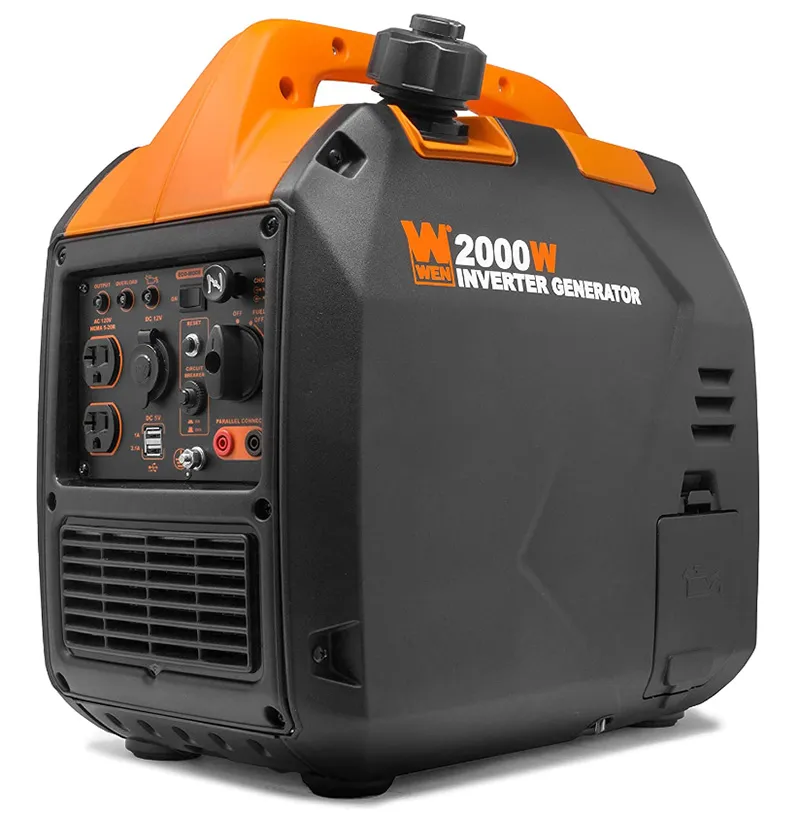
Make: Honda
Model: EU2200i
Electric Start: No
Fuel: Gasoline
Technology: Inverter
Gas Starting Watts: 2200
Gas Running Watts: 1800
Weight (lbs): 46.5
Noise (dB): 48
The Honda EU2200i is a premium portable inverter renowned for its durability and reliability. It’s both quiet and relatively light and is an excellent solution for recreational activities and for powering your RV and tools. It’s also used for providing limited short-term power during when needed.
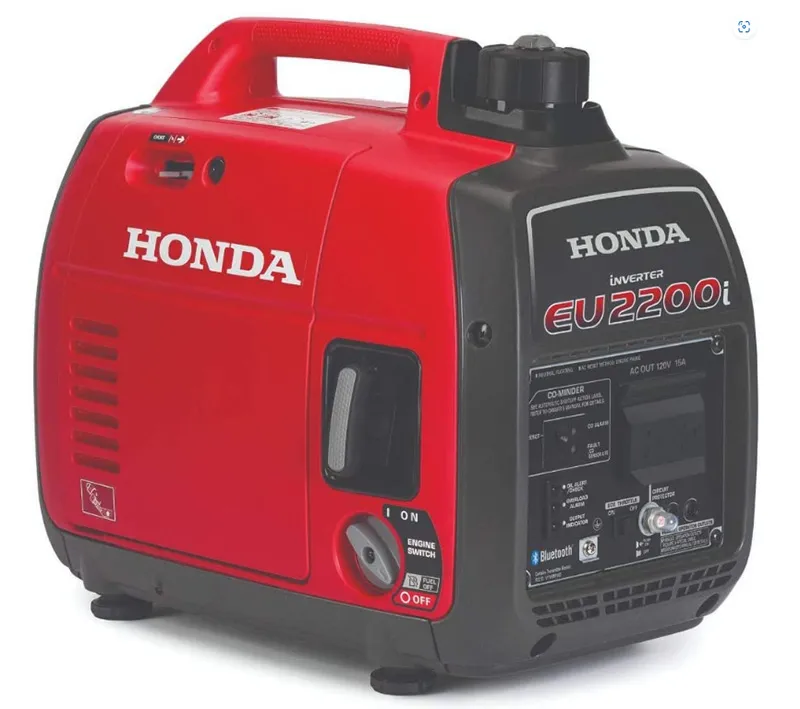
Make: Generac
Model: iQ3500
Electric Start: Yes
Fuel: Gasoline
Technology: Inverter
Gas Starting Watts: 3500
Gas Running Watts: 3000
Weight (lbs): 109.1
Noise (dB): 0
The gasoline powered iQ3500 is an inverter that offers the benefits of powering equipment and devices while away from home making it ideal for recreational activities such as tailgating and camping trips.The durable, yet lightweight, design is engineered for practicality and easy portability.
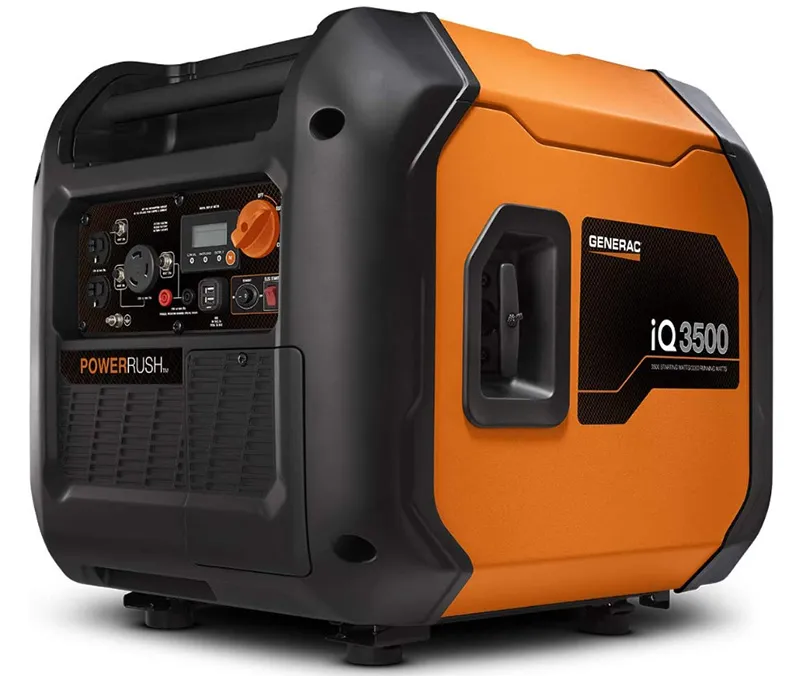
Make: Generac
Model: GP3500iO
Electric Start: No
Fuel: Gasoline
Technology: Inverter
Gas Starting Watts: 3500
Gas Running Watts: 3000
Weight (lbs): 74.3
Noise (dB): 0
The Generac GP3500iO is an open frame inverter featuring advanced PowerRush™ technology, which delivers over 50% more starting power. It’s both quiet and light and is an ideal companion for camping and your RV. It’s can aslo help power essential appliances when the grid goes down.
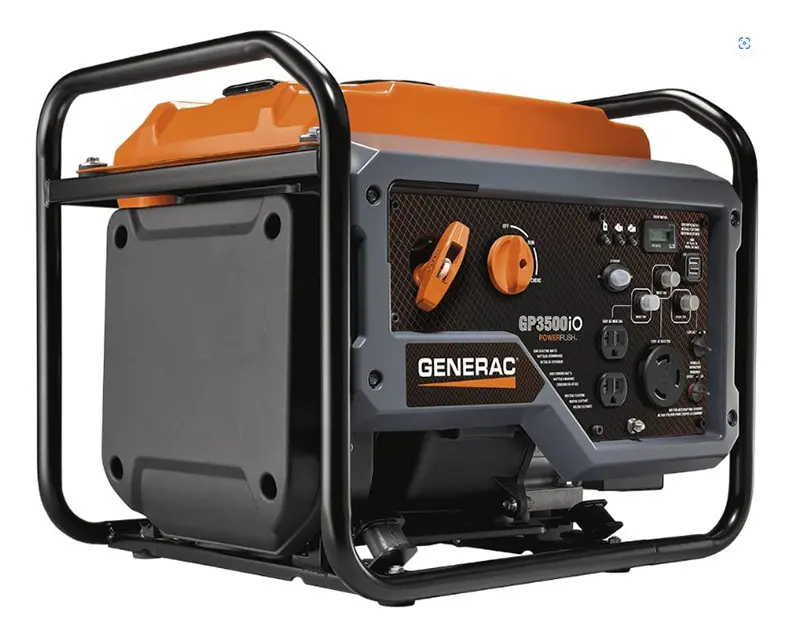
Make: Generac
Model: GP2200i
Electric Start: No
Fuel: Gasoline
Technology: Inverter
Gas Starting Watts: 2200
Gas Running Watts: 1700
Weight (lbs): 48
Noise (dB): 0
The GP2200i inverter provides an economical portable power solution for outdoor enthusiasts as it provides the stable and quiet power they need. It’s a compact unit and has a fully-enclosed lightweight design to make transportation easy. All in all, the Generac GP2200i represents great value.
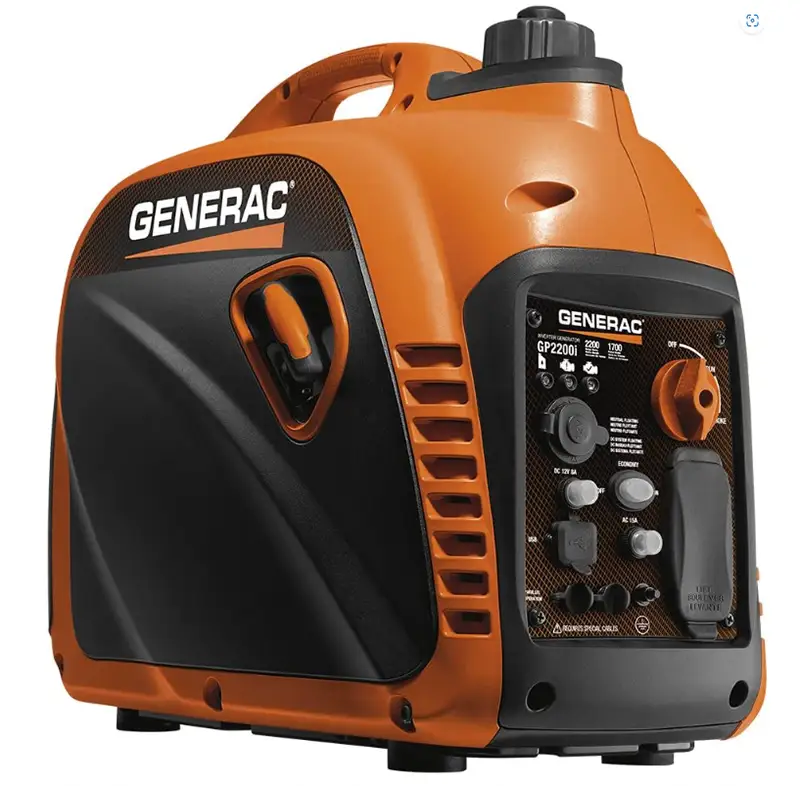
Make: Champion
Model: 100692
Electric Start: No
Fuel: Gasoline
Technology: Inverter
Gas Starting Watts: 2000
Gas Running Watts: 1700
Weight (lbs): 39.5
Noise (dB): 53
This model is described by Champion as ideal for camping, tailgating, powering items around the RV, or providing backup for a few basics in the home. It’s a small, well-built, light weight and low powered portable generator. And it’s one of the quietest around. That said, it is not recommended for emergency home backup.
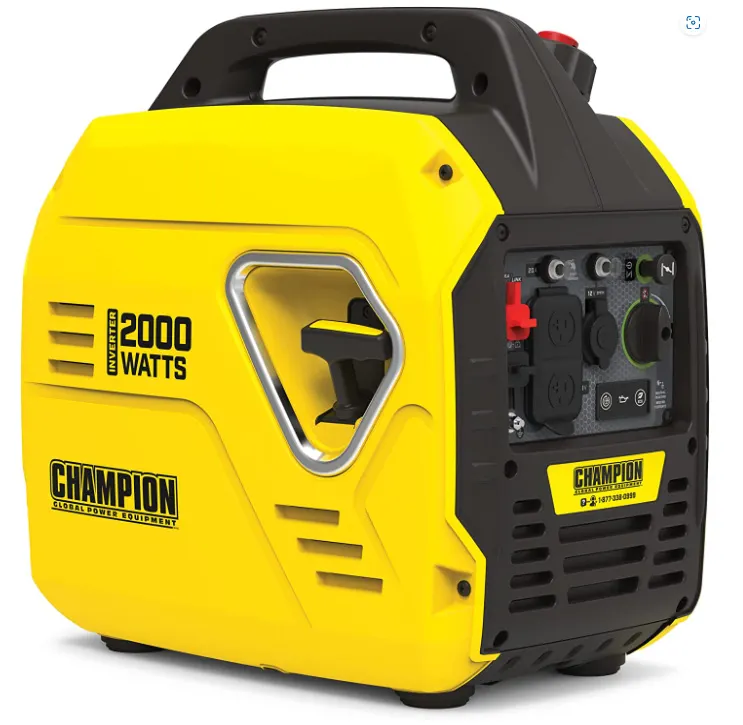
Make: Champion
Model: 100519
Electric Start: No
Fuel: Gasoline
Technology: Inverter
Gas Starting Watts: 6250
Gas Running Watts: 5000
Weight (lbs): 121
Noise (dB): 70
The Champion 100519 has an open frame design and an innovative shape. It integrates Quiet Technology and is said to be 50% quieter than comparable 5000 watt generators. Champion also say that they have also managed to make it 20% lighter by redesigning a smaller footprint, in other words reducing its overall shape and size.
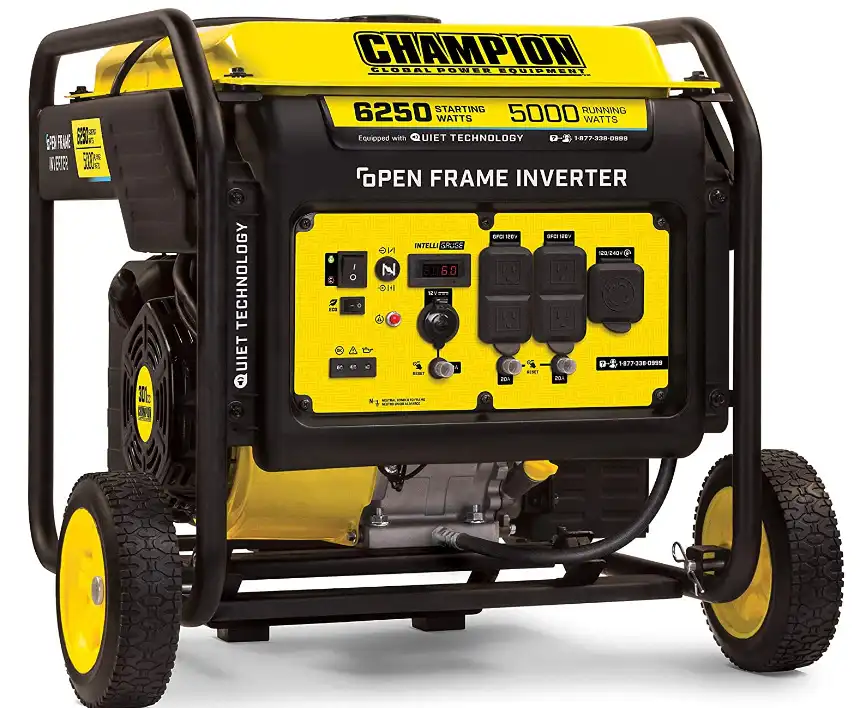
Make: Briggs & Stratton
Model: Q6500
Electric Start: No
Fuel: Gasoline
Technology: Inverter
Gas Starting Watts: 6500
Gas Running Watts: 5000
Weight (lbs): 139
Noise (dB): 66
The Quiet Power Series Q6500 packs a lot of power for a closed frame portable generator. It has a 306cc engine which is fitted with CO Guard to help keep you safe from toxic carbon monoxide fumes while the unit is operating in the open air. Inverter technology makes it a safe bet for you to use with sensitive electronics.
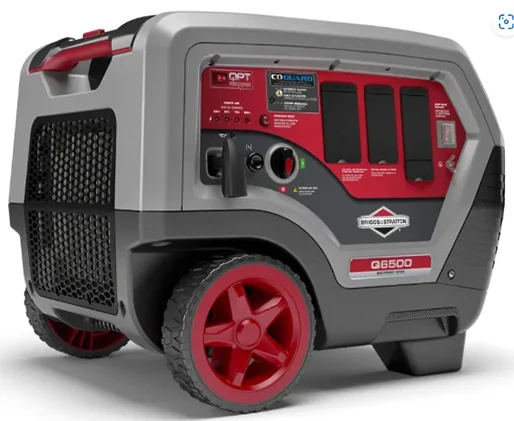
Make: Briggs & Stratton
Model: P4500
Electric Start: Yes
Fuel: Gasoline
Technology: Inverter
Gas Starting Watts: 4500
Gas Running Watts: 3700
Weight (lbs): 104
Noise (dB): 60
The PowerSmart Series™ P4500 is designed for more serious camping with an RV and other kinds of recreational use than the smaller P2400. It’s also a premium choice for partial home backup during emergencies and power outages. It comes with an electric start and CO Guard, a system to help warn you of dangerous carbon monoxide levels. And being an inverter, it’s okay to connect sensitive electronics.
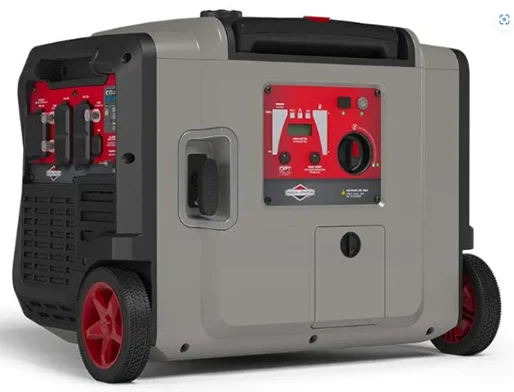
Make: Briggs & Stratton
Model: P2400
Electric Start: No
Fuel: Gasoline
Technology: Inverter
Gas Starting Watts: 2400
Gas Running Watts: 1800
Weight (lbs): 51
Noise (dB): 62
This Briggs & Stratton has a long run time of 8 hours at 25% load. It is equipped with CO Guard technology to help keep you and your family safe by warning you of the presence of toxic carbon monoxide fumes. It’s able to keep your home essentials powered during an outage and, as an inverter, it’s safe for you to use with sensitive electronics.
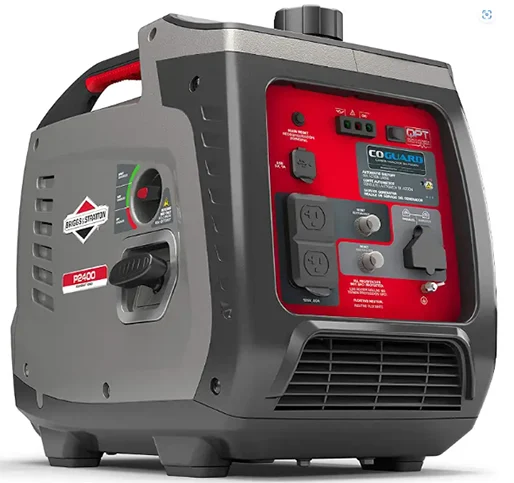
Make: A-iPower
Model: SUA4000iED
Electric Start: No
Fuel: Dual Fuel
Technology: Inverter
Gas Starting Watts: 4000
Gas Running Watts: 3500
Propane Starting Watts: 3500
Propane: Running Watts: 3200
Weight (lbs): 125
Noise (dB): 58
A reasonably sized portable generator that’s RV-Ready and fairly quiet in operation. It could be a great option if you are looking for a portable generator with a decent amount of power for recreational activities, such as camping, as well as being a handy resource when faced with a power outage. Its inverter technology makes it safe to connect sensitive electronics.
